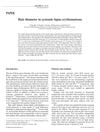 13 citations,
December 2017 in “BMC Complementary and Alternative Medicine”
13 citations,
December 2017 in “BMC Complementary and Alternative Medicine” The Asian herbal mix with Houttuynia cordata, Perilla frutescens, and green tea helped grow hair in mice.
 11 citations,
July 2017 in “Regenerative Medicine”
11 citations,
July 2017 in “Regenerative Medicine” The patch assay can create mature hair follicles from human cells and may help in hair loss treatments.
 5 citations,
January 2017 in “Laboratory Animal Research”
5 citations,
January 2017 in “Laboratory Animal Research” Gold thread implantation may help hair grow in humans and mice.
 9 citations,
March 2009 in “European Journal of Dermatology”
9 citations,
March 2009 in “European Journal of Dermatology” Schisandra nigra extract may help hair grow by stimulating cells and preventing hair follicle damage.
 98 citations,
May 2008 in “Archives of Dermatological Research”
98 citations,
May 2008 in “Archives of Dermatological Research” Eclipta alba extract helps hair grow faster and more effectively than minoxidil in rats.
 10 citations,
December 2014 in “PubMed”
10 citations,
December 2014 in “PubMed” Finasteride, a hair loss drug, may cause sexual dysfunction and depression, but these effects are usually temporary and the drug is generally safe. More research is needed.
 36 citations,
October 1996 in “Dermatologic Clinics”
36 citations,
October 1996 in “Dermatologic Clinics” Mice are useful for researching human hair loss and testing treatments, despite some differences between species.
 185 citations,
March 2011 in “The Journal of Sexual Medicine”
185 citations,
March 2011 in “The Journal of Sexual Medicine” Finasteride for hair loss can cause long-lasting sexual side effects like low libido and erectile dysfunction.
 6 citations,
March 2018 in “Journal of Medicinal Food”
6 citations,
March 2018 in “Journal of Medicinal Food” Chicken egg yolk peptides can promote hair growth by increasing a specific growth factor.
 6 citations,
April 2006 in “Lupus”
6 citations,
April 2006 in “Lupus” People with lupus and rheumatoid arthritis have thinner hair than healthy people.
 12 citations,
August 2017 in “Archives of Pharmacal Research”
12 citations,
August 2017 in “Archives of Pharmacal Research” Lecithin-based microparticles can deliver minoxidil for hair growth effectively with less skin irritation.
 109 citations,
July 1993 in “The journal of investigative dermatology/Journal of investigative dermatology”
109 citations,
July 1993 in “The journal of investigative dermatology/Journal of investigative dermatology” Hair color production is closely linked to the active growth phase of hair in mice and may also influence hair growth itself.
 2 citations,
February 2019 in “Journal of Investigative Dermatology”
2 citations,
February 2019 in “Journal of Investigative Dermatology” Higher levels of the DP2 receptor may lead to hair loss.
 21 citations,
May 2016 in “The Cochrane library”
21 citations,
May 2016 in “The Cochrane library” Topical minoxidil helps treat female pattern hair loss, but more research needed for other treatments.
 50 citations,
November 2010 in “Plastic and Reconstructive Surgery”
50 citations,
November 2010 in “Plastic and Reconstructive Surgery” Botox increased hair count in men with baldness and might work by improving scalp blood flow.
 8 citations,
June 2019 in “Scientific Reports”
8 citations,
June 2019 in “Scientific Reports” Increased PPARGC1α relates to hair thinning in common baldness.
 4 citations,
December 2022 in “Frontiers in cell and developmental biology”
4 citations,
December 2022 in “Frontiers in cell and developmental biology” Zebrafish larvae are used to study and find treatments for ear cell damage because they are easier to observe and test than mammals.
 21 citations,
March 2017 in “Skin research and technology”
21 citations,
March 2017 in “Skin research and technology” Removing external lipids from hair reduces moisture and increases strength, while removing internal lipids decreases water permeability.
 44 citations,
July 2004 in “Archives of Dermatology”
44 citations,
July 2004 in “Archives of Dermatology” Finasteride for hair loss has minimal impact on sexual function.
 78 citations,
February 2004 in “British Journal of Dermatology”
78 citations,
February 2004 in “British Journal of Dermatology” Melatonin helps hair growth in women with hair loss.
 October 1990 in “Archives of Dermatology”
October 1990 in “Archives of Dermatology” Hair loss and growth can be accurately measured using computer-assisted counting.
 13 citations,
June 2015 in “International Journal of Dermatology”
13 citations,
June 2015 in “International Journal of Dermatology” Patients with hair loss are much more likely to have body dysmorphic disorder than general dermatology patients.

Premature greying of hair affects the social lives of medical students but not their self-esteem.
 33 citations,
January 2002
33 citations,
January 2002 Latanoprost, a glaucoma drug, showed potential for promoting hair growth in bald monkeys, especially at higher doses.
 February 2022 in “Pakistan Journal of Medical and Health Sciences”
February 2022 in “Pakistan Journal of Medical and Health Sciences” Taking 2.5mg of finasteride daily can effectively improve hair loss in 62% of women, especially those pre-menopause or with less severe hair loss.
 16 citations,
June 2019 in “International Journal of Women's Dermatology”
16 citations,
June 2019 in “International Journal of Women's Dermatology” Type 2 diabetes may increase the risk of severe hair loss in African American women.
 17 citations,
December 2019 in “Stem Cell Research & Therapy”
17 citations,
December 2019 in “Stem Cell Research & Therapy” Grouping certain skin cells together activates a growth pathway that helps create new hair follicles.
 45 citations,
June 2004 in “Lasers in Medical Science”
45 citations,
June 2004 in “Lasers in Medical Science” Intense pulsed light (IPL) is an efficient and safe method for hair removal, reducing hair by about 80%.
 12 citations,
December 1987 in “Cancer Chemotherapy and Pharmacology”
12 citations,
December 1987 in “Cancer Chemotherapy and Pharmacology” Vitamin E in the diet might help protect against hair loss caused by the chemotherapy drug doxorubicin in rabbits.
 11 citations,
December 2018 in “Journal of Dermatology”
11 citations,
December 2018 in “Journal of Dermatology” Finasteride effectively treats hair loss in Korean men for at least 5 years, with V type responding better.





























